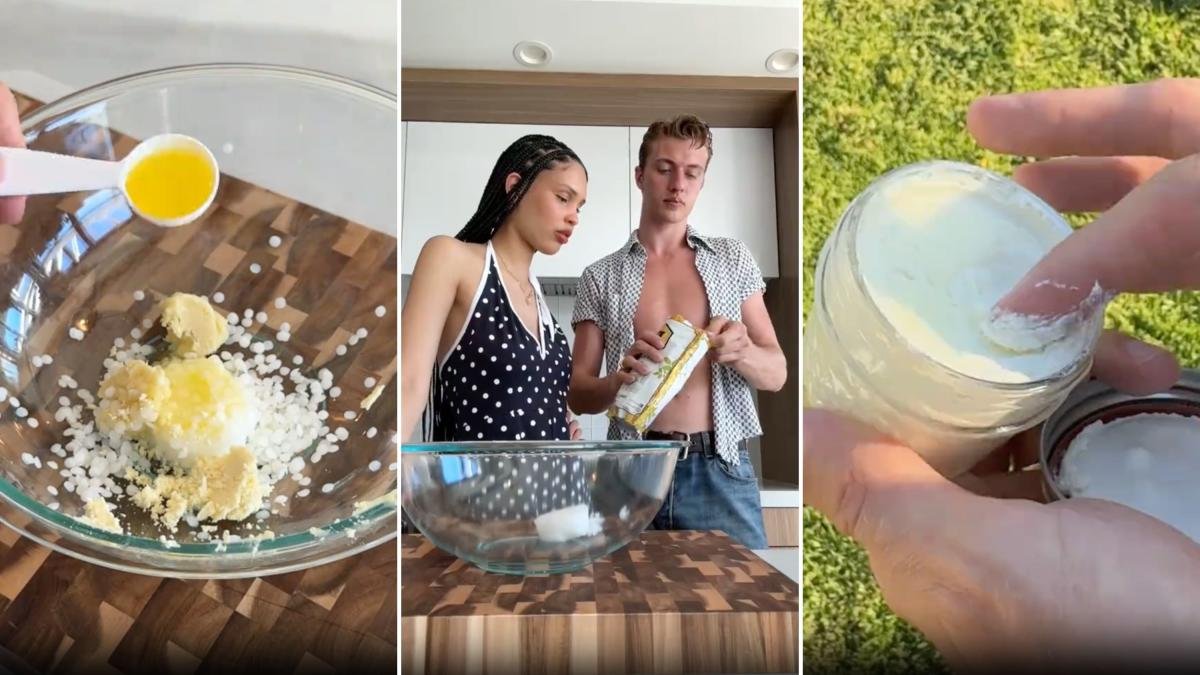Model and content creator Nara Smith encourages viewers to make cereal from scratch, DIY throat lozenges, and make toothpaste from bentonite clay, baking soda, and peppermint essential oil, but will her latest video with her husband, Lucky Blue Smith, inspire people to make their own sunscreen?
Here’s what’s new:
-
Who are these people? Nala is a 22-year-old model, influencer, and mother of three, who is married to fellow model Lucky. While Lucky was already famous before, Nala gained a following on TikTok with her indulgent, comforting cooking videos. She has become synonymous with the so-called tradwife trend, an updated take on the traditional housewife. Lucky appears frequently on her page, where she has 8.1 million followers.
-
The two posted a video sharing their homemade sunscreen recipe on June 25. “We all tend to burn easily, so we chose something with a slightly higher SPF,” Nara said.
-
The recipe called for six ingredients: coconut oil, beeswax, shea butter, cocoa butter, jojoba oil, and zinc oxide powder.
-
Nara claimed the product “applied very smoothly and left no white residue,” without mentioning how effective it was at protecting the skin or preventing sunburn.
-
The couple are the latest in a long line of influencers to share sunscreen recipes, including controversial figure Dr Paul Saladino, who previously faced criticism for claiming his animal-based sunscreen was “100000000000 times better than conventional sunscreen.”
What’s wrong with homemade sunscreen?
I don’t know if that plays a role, and it probably doesn’t.
“Homemade sunscreens are generally ineffective,” Hannah Kopelman, MD, a dermatologist at Kopelman Cosmetic Surgery, tells Yahoo Life. “Sunscreen efficacy depends on its ability to block or absorb UV rays, which requires a precise blend of specific ingredients. Commercial sunscreens undergo rigorous testing to ensure they provide broad-spectrum protection and have a verified SPF rating.” SPF stands for Sun Protection Factor, and according to the American Academy of Dermatology (AAD), it’s a measure of how well a sunscreen protects you from sunburn. The AAD recommends using an SPF of 30 or higher, but you can’t judge that at home. “Homemade sunscreens don’t have this testing and regulation, so it’s impossible to guarantee consistently adequate protection,” Kopelman says.
As for Nara and Lucky’s homemade sunscreen, Los Angeles-based dermatologist Dr. Mina Amin said the ingredients in it “pose a lot of problems.”
“Coconut oil and jojoba oil absorb sunlight and can actually cause burns. Beeswax, shea butter, and cocoa butter are supposed to be moisturizing, but they don’t provide any protection from the sun,” she tells Yahoo Life.
The same goes for Saladino recipes, which contain tallow (animal fat), and while tallow may contain moisturizing properties and vitamins A, D, K and E, Kopelman says, “it doesn’t provide any sun protection.” There’s also the risk of bacterial contamination and skin irritation from the animal protein.
In these and most other recipes, zinc oxide powder is the only ingredient that can provide any protection from the sun, if used properly.
“Although zinc oxide is an ingredient in mineral sunscreens, you should not use it when making homemade sunscreen at home,” Amin says. “The formula is not the same as that used in sunscreens and will not provide the same protection as mineral sunscreens.”
A chemist on TikTok explained that distribution of zinc oxide is paramount, and that optimal distribution can’t be achieved with the kitchen mixer or whisk that Saladino and Smith used, respectively. She also pointed to a 2020 study that found that many sunscreen recipes found online offer no sun protection whatsoever. The most effective products have an SPF of less than 6, which is practically nonexistent.
Other content creators have made videos testing homemade sunscreens with UV-detecting stickers.
Why this trend is a warning sign
According to Florida-based dermatologist Dr. Anna Chacon, sunscreen is an essential part of your daily skin care routine. “Sunscreen is important for skin health and is a preventative product that should be worn daily. In the short term, it helps prevent sunburn, and in the long term, it helps with anti-aging and protects against skin cancer,” she tells Yahoo Life.
And perhaps even scarier than not wearing any sunscreen at all is the belief that homemade sunscreen will protect against those risks. Influencing TikTok followers to do so is irresponsible, Kopelman says.
“Sharing homemade sunscreen recipes online is dangerous because it can give people a false sense of security,” she says.
summary
When it comes to homemade recipes you find online, stick to baked goods.
But when it comes to skin care, it’s important to use tried-and-true products or consult with your doctor about the most effective options. You can also try Korean-made sunscreens, which are growing in popularity and are dermatologist-approved. Just remember to apply them properly for protection.
Health risks aside, a sunburn isn’t a good look for anyone—even Nara Smith.

